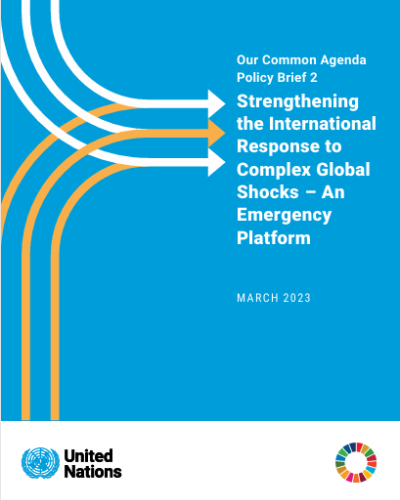Our Common Agenda Policy Brief 2: Strengthening the International Response to Complex Global Shocks – An Emergency Platform

The present policy brief aims to elaborate on the proposal on the Emergency Platform to respond to complex global shocks, incorporating feedback received from Member States and other relevant partners. The Emergency Platform would not be a standing body or entity but a set of protocols that could be activated when needed. The brief out lines some of the characteristics of global shocks in the twenty-first century and some of the risks we could face in the future. It highlights how such shocks have the potential to undermine progress to achieving the Sustainable Development Goals and 2030 Agenda, as well as human rights and gender equality. It reflects on lessons from the response to recent complex global shocks and sets out proposals to strengthen the international response to a complex, global shock through the convening of an Emergency Platform. Finally, it offers recommendations on how these proposals could be taken forward in the Pact for the Future.
In September 2020, at the height of the corona virus disease (COVID-19) pandemic, the General Assembly adopted resolution 75/1, containing a declaration on the commemoration of the seventy-fifth anniversary of the United Nations. In that declaration, Heads of State and Government stated that: “There is no other global organization with the legitimacy, convening power, and normative impact of the United Nations”, and committed to being prepared and emphasized the need to improve “our preparedness for not only health-related crises but also other challenges and crises”.
In Our Common Agenda, I proposed to Member States that we work together on arrangements to convene and operate an Emergency Platform in the event of complex global crises. I stated that: “The platform would not be a new permanent or standing body or institution. It would be triggered automatically in crises of sufficient scale and magnitude, regardless of the type or nature of the crisis involved. Once activated, it would bring together leaders from Member States, the United Nations system, key country groupings, interna tional financial institutions, regional bodies, civil society, the private sector, subject-specific indus tries or research bodies, and other experts.” This proposal would allow the convening role of the United Nations to be maximized in the face of crises with global reach and should be “agnostic as to the type of crisis”, as we do not know what type of global shock we may face in the future, although the probability of their occurrence is growing.





















